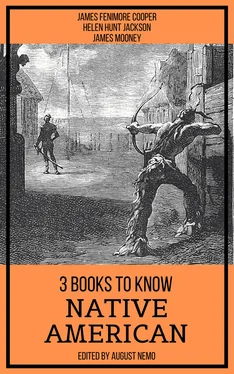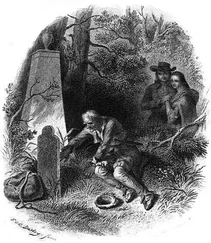16 It has long been a practice with the whites to conciliate the important men of the Indians, by presenting medals, which are worn in the place of their own rude ornaments. Those given by the English generally bear the impression of the reigning king, and those given by the Americans that of the president.
“What will the young chief who comes from towards the sun, give?” demanded the Huron, observing that Heyward hesitated in his desire to end the enumeration of benefits with that which might form the climax of an Indian’s wishes.
“He will make the fire-water from the Islands in the salt lake flow before the wigwam of Magua, until the heart of the Indian shall be lighter than the feathers of the humming-bird, and his breath sweeter than the wild honeysuckle.”
Le Renard had listened gravely as Heyward slowly proceeded in his subtle speech. When the young man mentioned the artifice he supposed the Indian to have practised on his own nation, the countenance of the listener was veiled in an expression of cautious gravity. At the allusion to the injury which Duncan affected to believe had driven the Huron from his native tribe, a gleam of such ungovernable ferocity flashed from the other’s eyes, as induced the adventurous speaker to believe he had struck the proper chord. And by the time he reached the part where he so artfully blended the thirst of vengeance with the desire of gain, he had, at least, obtained a command of the deepest attention of the savage. The question put by Le Renard had been calm, and with all the dignity of an Indian; but it was quite apparent, by the thoughtful expression of the listener’s countenance, that the answer was most cunningly devised. The Huron mused a few moments, and then laying his hand on the rude bandages of his wounded shoulder, he said, with some energy —
“Do friends make such remarks?”
“Would La Longue Carabine cut one so light on an enemy?”
“Do the Delawares crawl upon those they love, like snakes, twisting themselves to strike?”
“Would Le Gros Serpent have been heard by the ears of one he wished to be deaf?”
“Does the white chief burn his powder in the faces of his brothers?”
“Does he ever miss his aim, when seriously bent to kill?” returned Duncan, smiling with well acted sincerity.
Another long and deliberate pause succeeded these sententious questions and ready replies. Duncan saw that the Indian hesitated. In order to complete his victory, he was in the act of recommencing the enumeration of the rewards, when Magua made an expressive gesture and said —
“Enough; Le Renard is a wise chief, and what he does will be seen. Go, and keep the mouth shut. When Magua speaks, it will be the time to answer.”
Heyward, perceiving that the eyes of his companion were warily fastened on the rest of the band, fell back immediately, in order to avoid the appearance of any suspicious confederacy with their leader. Magua approached the horses, and affected to be well pleased with the diligence and ingenuity of his comrades. He then signed to Heyward to assist the sisters into the saddles, for he seldom deigned to use the English tongue, unless urged by some motive of more than usual moment.
There was no longer any plausible pretext for delay; and Duncan was obliged, however reluctantly, to comply. As he performed this office, he whispered his reviving hopes in the ears of the trembling females, who, through dread of encountering the savage countenances of their captors, seldom raised their eyes from the ground. The mare of David had been taken with the followers of the large chief; in consequence, its owner, as well as Duncan, was compelled to journey on foot. The latter did not, however, so much regret this circumstance, as it might enable him to retard the speed of the party; for he still turned his longing looks in the direction of Fort Edward, in the vain expectation of catching some sound from that quarter of the forest, which might denote the approach of succor.
When all were prepared, Magua made the signal to proceed, advancing in front to lead the party in person. Next followed David, who was gradually coming to a true sense of his condition, as the effects of the wound became less and less apparent. The sisters rode in his rear, with Heyward at their side, while the Indians flanked the party, and brought up the close of the march, with a caution that seemed never to tire.
In this manner they proceeded in uninterrupted silence, except when Heyward addressed some solitary word of comfort to the females, or David gave vent to the moanings of his spirit in piteous exclamations, which he intended should express the humility of resignation. Their direction lay towards the south, and in a course nearly opposite to the road to William Henry. Notwithstanding this apparent adherence in Magua to the original determination of his conquerors, Heyward could not believe his tempting bait was so soon forgotten; and he knew the windings of an Indian path too well, to suppose that its apparent course led directly to its object, when artifice was at all necessary. Mile after mile was, however, passed through the boundless woods, in this painful manner, without any prospect of a termination to their journey. Heyward watched the sun, as he darted his meridian rays through the branches of the trees, and pined for the moment when the policy of Magua should change their route to one more favorable to his hopes. Sometimes he fancied the wary savage, despairing of passing the arm of Montcalm in safety, was holding his way towards a well-known border settlement, where a distinguished officer of the crown, and a favored friend of the Six Nations, held his large possessions, as well as his usual residence. To be delivered into the hands of Sir William Johnson was far preferable to being led into the wilds of Canada; but in order to effect even the former, it would be necessary to traverse the forest for many weary leagues, each step of which was carrying him farther from the scene of the war, and, consequently, from the post, not only of honor, but of duty.
Cora alone remembered the parting injunctions of the scout, and whenever an opportunity offered, she stretched forth her arm to bend aside the twigs that met her hands. But the vigilance of the Indians rendered this act of precaution both difficult and dangerous. She was often defeated in her purpose, by encountering their watchful eyes, when it became necessary to feign an alarm she did not feel, and occupy the limb by some gesture of feminine apprehension. Once, and once only, was she completely successful; when she broke down the bough of a large sumach, and, by a sudden thought, let her glove fall at the same instant. This sign, intended for those that might follow, was observed by one of her conductors, who restored the glove, broke the remaining branches of the bush in such a manner that it appeared to proceed from the struggling of some beast in its branches, and then laid his hand on his tomahawk, with a look so significant, that it put an effectual end to these stolen memorials of their passage.
As there were horses, to leave the prints of their footsteps, in both bands of the Indians, this interruption cut off any probable hopes of assistance being conveyed through the means of their trail.
Heyward would have ventured a remonstrance, had there been anything encouraging in the gloomy reserve of Magua. But the savage, during all this time, seldom turned to look at his followers, and never spoke. With the sun for his only guide, or aided by such blind marks as are only known to the sagacity of a native, he held his way along the barrens of pine, through occasional little fertile vales, across brooks and rivulets, and over undulating hills, with the accuracy of instinct, and nearly with the directness of a bird. He never seemed to hesitate. Whether the path was hardly distinguishable, whether it disappeared, or whether it lay beaten and plain before him, made no sensible difference in his speed or certainty. It seemed as if fatigue could not affect him. Whenever the eyes of the wearied travellers rose from the decayed leaves over which they trod, his dark form was to be seen glancing among the stems of the trees in front, his head immovably fastened in a forward position, with the light plume on his crest fluttering in a current of air, made solely by the swiftness of his own motion.
Читать дальше












